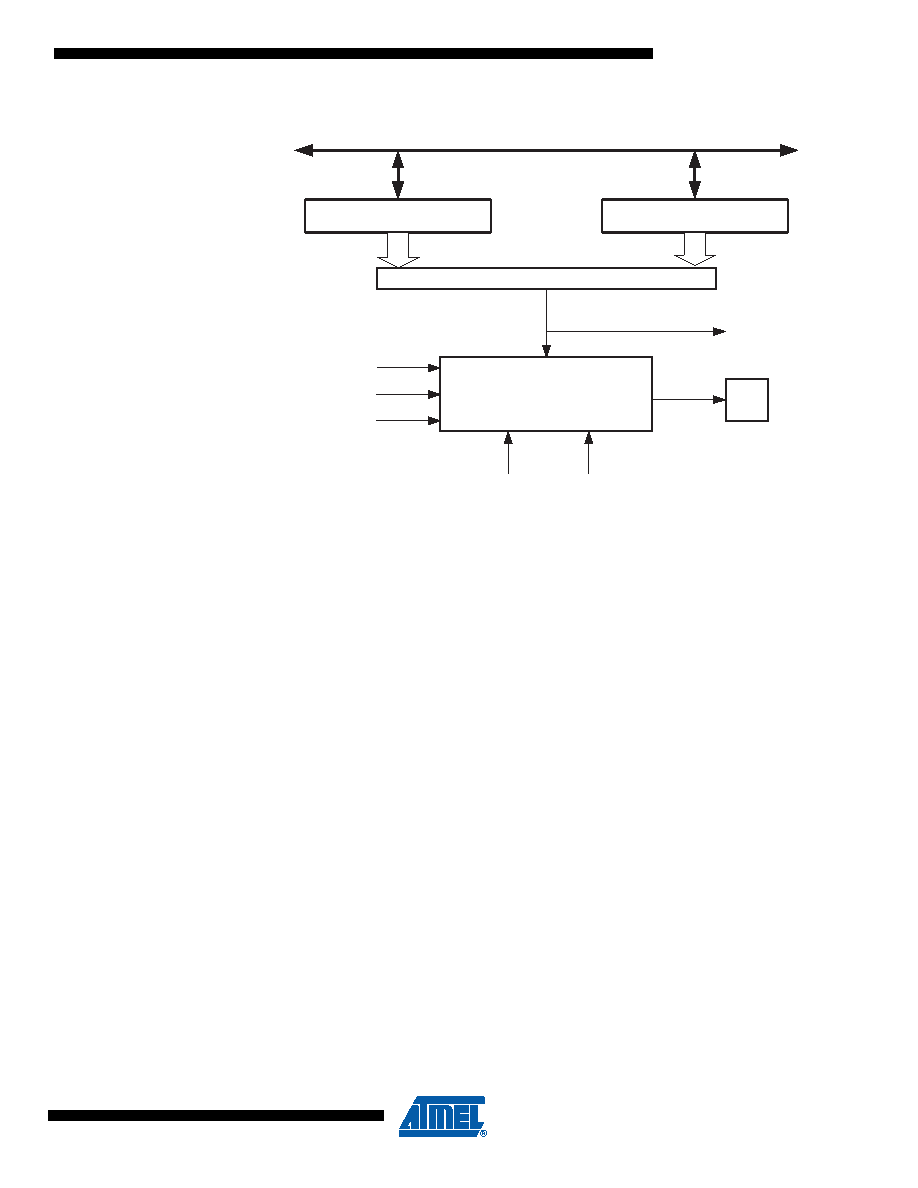- 您現(xiàn)在的位置:買賣IC網(wǎng) > PDF目錄25624 > MC80C32-36SHXXX (TEMIC SEMICONDUCTORS) 8-BIT, 36 MHz, MICROCONTROLLER, CDIP40 PDF資料下載
參數(shù)資料
| 型號(hào): | MC80C32-36SHXXX |
| 廠商: | TEMIC SEMICONDUCTORS |
| 元件分類: | 微控制器/微處理器 |
| 英文描述: | 8-BIT, 36 MHz, MICROCONTROLLER, CDIP40 |
| 文件頁數(shù): | 82/83頁 |
| 文件大小: | 8336K |
| 代理商: | MC80C32-36SHXXX |
第1頁第2頁第3頁第4頁第5頁第6頁第7頁第8頁第9頁第10頁第11頁第12頁第13頁第14頁第15頁第16頁第17頁第18頁第19頁第20頁第21頁第22頁第23頁第24頁第25頁第26頁第27頁第28頁第29頁第30頁第31頁第32頁第33頁第34頁第35頁第36頁第37頁第38頁第39頁第40頁第41頁第42頁第43頁第44頁第45頁第46頁第47頁第48頁第49頁第50頁第51頁第52頁第53頁第54頁第55頁第56頁第57頁第58頁第59頁第60頁第61頁第62頁第63頁第64頁第65頁第66頁第67頁第68頁第69頁第70頁第71頁第72頁第73頁第74頁第75頁第76頁第77頁第78頁第79頁第80頁第81頁當(dāng)前第82頁第83頁

93
7707F–AVR–11/10
AT90USB82/162
Figure 14-3. Output Compare Unit, Block Diagram
The OCR0x Registers are double buffered when using any of the Pulse Width Modulation
(PWM) modes. For the normal and Clear Timer on Compare (CTC) modes of operation, the dou-
ble buffering is disabled. The double buffering synchronizes the update of the OCR0x Compare
Registers to either top or bottom of the counting sequence. The synchronization prevents the
occurrence of odd-length, non-symmetrical PWM pulses, thereby making the output glitch-free.
The OCR0x Register access may seem complex, but this is not case. When the double buffering
is enabled, the CPU has access to the OCR0x Buffer Register, and if double buffering is dis-
abled the CPU will access the OCR0x directly.
14.4.1
Force Output Compare
In non-PWM waveform generation modes, the match output of the comparator can be forced by
writing a one to the Force Output Compare (FOC0x) bit. Forcing Compare Match will not set the
OCF0x Flag or reload/clear the timer, but the OC0x pin will be updated as if a real Compare
Match had occurred (the COM0x1:0 bits settings define whether the OC0x pin is set, cleared or
toggled).
14.4.2
Compare Match Blocking by TCNT0 Write
All CPU write operations to the TCNT0 Register will block any Compare Match that occur in the
next timer clock cycle, even when the timer is stopped. This feature allows OCR0x to be initial-
ized to the same value as TCNT0 without triggering an interrupt when the Timer/Counter clock is
enabled.
14.4.3
Using the Output Compare Unit
Since writing TCNT0 in any mode of operation will block all Compare Matches for one timer
clock cycle, there are risks involved when changing TCNT0 when using the Output Compare
Unit, independently of whether the Timer/Counter is running or not. If the value written to TCNT0
equals the OCR0x value, the Compare Match will be missed, resulting in incorrect waveform
OCFnx (Int.Req.)
= (8-bit Comparator )
OCRnx
OCnx
DATA BUS
TCNTn
WGMn1:0
Waveform Generator
top
FOCn
COMnX1:0
bottom
相關(guān)PDF資料 |
PDF描述 |
|---|---|
| MQ80C32-20:RD | 8-BIT, 20 MHz, MICROCONTROLLER, CQFP44 |
| MQ80C52TXXX-16SHXXX:RD | 8-BIT, MROM, 16 MHz, MICROCONTROLLER, CQFP44 |
| MC80C52TXXX-12 | 8-BIT, MROM, 12 MHz, MICROCONTROLLER, CDIP40 |
| MC88LV926DW | 88LV SERIES, PLL BASED CLOCK DRIVER, 4 TRUE OUTPUT(S), 1 INVERTED OUTPUT(S), PDSO20 |
| MC9328MX21SCVM | 32-BIT, 266 MHz, MICROPROCESSOR, PBGA289 |
相關(guān)代理商/技術(shù)參數(shù) |
參數(shù)描述 |
|---|---|
| MC-80C32E-30 | 制造商:AIMTEC 制造商全稱:AIMTEC 功能描述:Rad. Tolerant 8-bit ROMless Microcontroller |
| MC-80C32E-30-E | 制造商:AIMTEC 制造商全稱:AIMTEC 功能描述:Rad. Tolerant 8-bit ROMless Microcontroller |
| MC80D21000G | 制造商:COR 功能描述:RN |
| MC80F0104 | 制造商:未知廠家 制造商全稱:未知廠家 功能描述:8-BIT SINGLE-CHIP MICROCONTROLLERS |
| MC80F0104B | 制造商:未知廠家 制造商全稱:未知廠家 功能描述:8-BIT SINGLE-CHIP MICROCONTROLLERS |
發(fā)布緊急采購,3分鐘左右您將得到回復(fù)。